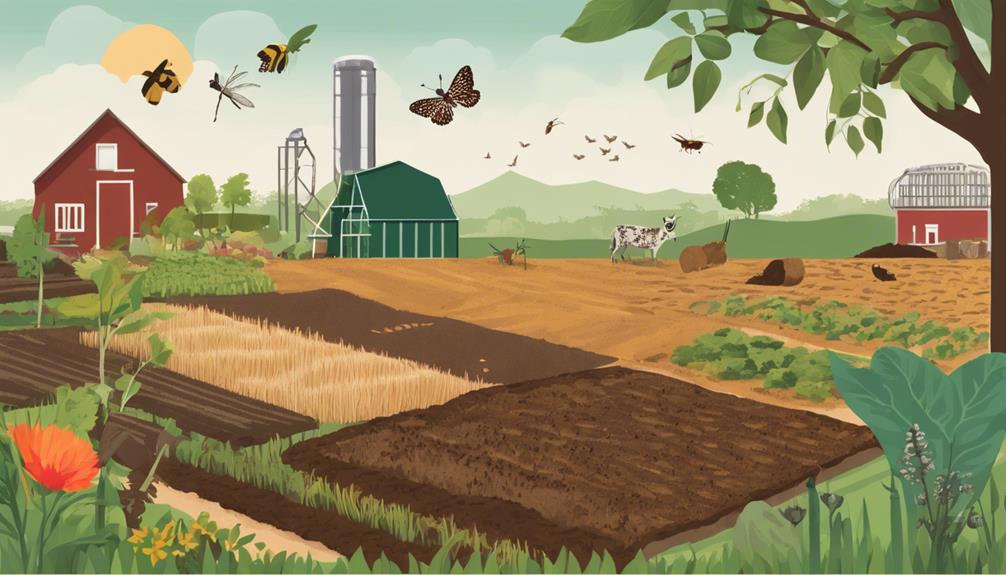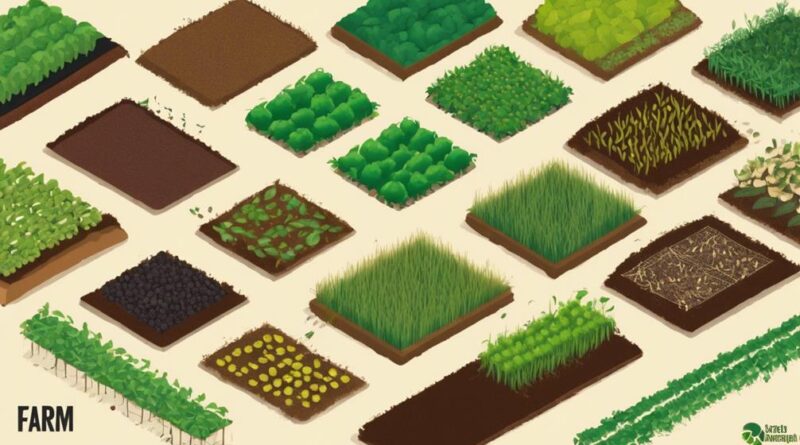Why Is Sustainable Agriculture Key to Waste Management?
In sustainable agriculture, waste management practices optimize resource efficiency and minimize environmental impact significantly. Organic farming enhances soil health and biodiversity, reducing food waste and promoting nutrient-rich soil amendments through composting. Circular economy practices focus on maximizing resource efficiency and minimizing waste in agricultural systems. Utilizing food scraps on farms enhances soil fertility and reduces reliance on synthetic fertilizers. Regenerative agriculture restores soil health, enhances biodiversity, and increases agricultural productivity. Farm waste management innovations, like biodegradable packaging and smart technology tools, optimize recycling processes. Sustainable agriculture is key to effective waste management solutions in agricultural systems.
Benefits of Organic Farming
Embracing organic farming practices can significantly enhance soil health, biodiversity, and crop resilience while minimizing environmental impact. Organic farming focuses on maintaining and improving soil health through practices such as crop rotation, composting, and avoiding synthetic chemicals. Research shows that organic farming methods lead to greater soil organic matter content, improved soil structure, and increased microbial activity, all of which contribute to better soil health.
Moreover, organic farming promotes crop diversity by encouraging the cultivation of a variety of crops within the same area. This practice helps in breaking the cycle of pests and diseases, reduces the need for chemical pesticides, and enhances ecosystem resilience. Diverse cropping systems also improve soil fertility by reducing nutrient depletion and promoting natural nutrient cycling processes.
Studies have demonstrated that organic farming systems support a higher abundance and diversity of beneficial insects, pollinators, and soil organisms compared to conventional farming methods. This increased biodiversity plays a crucial role in maintaining ecological balance, enhancing ecosystem services, and improving overall farm sustainability. By prioritizing soil health and crop diversity, organic farming not only ensures better yields and crop quality but also helps in building a more resilient and sustainable agricultural system for the future.
Reducing Food Waste in Agriculture
To address food waste in agriculture effectively, implementing efficient harvesting and storage practices is crucial. Minimizing spoilage and ensuring efficient distribution are key factors in reducing food waste in agriculture. Here are three strategies to help tackle this issue:
- Invest in Modern Harvesting Techniques: Utilizing modern techniques such as mechanized harvesting can significantly reduce the amount of produce lost during the harvesting process. By minimizing damage to crops and increasing efficiency, farmers can decrease spoilage rates and save more produce for distribution.
- Improve Storage Infrastructure: Upgrading storage facilities with proper ventilation, temperature control, and pest management systems can help prolong the shelf life of harvested crops. This reduces spoilage caused by inadequate storage conditions and ensures that more produce reaches consumers in optimal condition.
- Enhance Supply Chain Coordination: Establishing better coordination among farmers, distributors, and retailers can lead to more efficient distribution of agricultural products. By streamlining the supply chain and reducing delays in transportation, farmers can deliver fresh produce to markets promptly, decreasing the chances of spoilage along the way.
Composting in Sustainable Agriculture
Upgrading storage facilities with proper ventilation, temperature control, and pest management systems can help prolong the shelf life of harvested crops, thereby reducing spoilage and ensuring optimal conditions for distribution. Composting in sustainable agriculture offers a practical solution to further enhance resource efficiency and soil health in farming practices.
Composting benefits in sustainable agriculture are significant. By composting organic waste such as crop residues, food scraps, and manure, farmers can create nutrient-rich soil amendments. These amendments improve soil structure, increase water retention, and promote beneficial microbial activity. Research indicates that compost-amended soils have higher levels of organic matter, which enhances nutrient availability for plants, leading to improved crop yields and quality.
Moreover, composting plays a crucial role in soil enrichment. The organic matter in compost acts as a slow-release fertilizer, providing essential nutrients for plant growth over an extended period. This reduces the reliance on synthetic fertilizers, decreasing the risk of nutrient runoff and water pollution. Compost also helps suppress plant diseases and pests naturally, promoting a healthier ecosystem within the farming environment.
Implementing Circular Economy Practices
Circular economy practices offer a sustainable approach to maximizing resource efficiency and minimizing waste in agricultural systems. By implementing closed-loop systems and focusing on resource recovery, farms can significantly reduce their environmental impact while improving productivity.
Here are three key ways in which circular economy practices can be integrated into agricultural operations:
- Resource Recovery: Implementing practices such as using livestock manure for fertilizer or converting food waste into compost can help farms recover valuable resources that would otherwise go to waste. By closing the loop on resource utilization, farms can reduce the need for external inputs and minimize their overall environmental footprint.
- Closed Loop Systems: Developing closed-loop systems that recycle nutrients and materials within the farm can help create a more sustainable and self-sufficient agricultural operation. For example, using crop residues as livestock feed or utilizing wastewater for irrigation are ways to establish closed-loop systems that promote resource efficiency and waste reduction.
- Innovative Technologies: Embracing innovative technologies like precision agriculture, vertical farming, and renewable energy sources can further enhance the circular economy practices on farms. These technologies not only improve resource management but also increase productivity and profitability in the long run. By investing in these solutions, farms can optimize resource utilization and contribute to a more sustainable agricultural sector.
Utilizing Food Scraps on Farms
Maximizing resource efficiency in agricultural operations can be further enhanced by incorporating innovative strategies for utilizing food scraps on farms. Food scraps, often considered waste, can actually be a valuable resource for farmers. By composting food scraps, farmers can create nutrient-rich soil amendments that enhance soil fertility and structure, ultimately leading to increased crop yields.
When food scraps are composted and added to the soil, they contribute to soil enrichment by improving its organic matter content. This organic matter serves as a food source for beneficial microorganisms in the soil, promoting their growth and activity. As these microorganisms break down the organic matter from food scraps, they release essential nutrients such as nitrogen, phosphorus, and potassium, which are vital for plant growth. This process not only enriches the soil but also aids in nutrient recycling, ensuring that valuable nutrients aren't wasted but instead utilized by crops.
Moreover, utilizing food scraps for soil enrichment can help reduce the reliance on synthetic fertilizers, which can have detrimental effects on the environment. By adopting practices that involve recycling nutrients from food scraps, farmers can move towards more sustainable agricultural methods that promote long-term soil health and productivity. Overall, incorporating food scraps into farming practices is a simple yet effective way to promote sustainability and resource efficiency in agriculture.
Impact of Sustainable Agriculture on Waste
Have you ever considered how sustainable agriculture practices can significantly impact the management of waste in agricultural systems? Sustainable agriculture plays a crucial role in waste reduction and minimizing the environmental impact of farming activities. Let's delve into how sustainable agriculture practices can effectively address waste management:
- Composting: Sustainable agriculture encourages the use of composting to recycle organic waste materials. By composting food scraps, crop residues, and manure, farmers can create nutrient-rich soil amendments to enhance soil fertility. This not only reduces waste sent to landfills but also minimizes the need for chemical fertilizers, thereby lowering the environmental impact of agricultural activities.
- Precision Agriculture Techniques: Implementing precision agriculture techniques such as GPS-guided machinery and sensor technology helps farmers optimize resource use. By accurately applying water, fertilizers, and pesticides only where and when needed, sustainable agriculture minimizes waste production. This precision in resource management not only reduces input costs for farmers but also mitigates the environmental impact associated with excess nutrient runoff and chemical leaching.
- Crop Rotation and Diversification: Sustainable agriculture promotes crop rotation and diversification to improve soil health and pest management. Rotating crops helps break pest cycles, reducing the reliance on chemical pesticides. Additionally, diverse cropping systems enhance biodiversity and ecosystem resilience, contributing to sustainable waste management practices and reducing the environmental footprint of agriculture.
Role of Regenerative Agriculture

In the realm of sustainable agriculture, harnessing the potential of regenerative practices is paramount for enhancing soil health and ecosystem vitality. Regenerative agriculture focuses on restoring and improving soil health through practices that promote biodiversity, minimize soil disturbance, and enhance organic matter content. These practices not only benefit the environment but also contribute to increased agricultural productivity and resilience to climate change.
One of the key benefits of regenerative agriculture is its ability to enhance soil health. By promoting soil structure and fertility, regenerative practices help to improve water retention, nutrient availability, and microbial diversity. This, in turn, leads to increased crop yields and reduced reliance on synthetic fertilizers and pesticides.
Additionally, regenerative agriculture plays a crucial role in carbon sequestration, whereby atmospheric carbon dioxide is captured and stored in the soil. This process helps mitigate climate change by reducing greenhouse gas emissions and enhancing soil resilience.
Innovations in Farm Waste Management
To effectively manage farm waste, implementing innovative solutions is crucial for enhancing sustainability and reducing environmental impact. In today's agricultural landscape, advancements in waste management play a pivotal role in minimizing the industry's ecological footprint. Two key innovations driving progress in this domain are the adoption of biodegradable packaging and the integration of smart technology.
Biodegradable Packaging: Switching to biodegradable packaging materials for agricultural products can significantly reduce plastic waste on farms. These materials break down naturally over time, preventing soil and water pollution while promoting a circular economy. By using biodegradable options for packaging produce or storing harvested crops, farmers can align their operations with sustainable waste management practices.
Smart Technology: Incorporating smart technology tools like sensors and data analytics systems can revolutionize farm waste management. These technologies enable farmers to monitor waste levels, optimize recycling processes, and implement efficient disposal methods. For example, smart bins equipped with sensors can alert farmers when waste containers are nearing full capacity, enabling timely and organized waste collection and disposal. By leveraging smart technology, farmers can streamline their waste management practices, reduce unnecessary waste generation, and enhance overall operational efficiency.
Conclusion
In conclusion, sustainable agriculture plays a crucial role in waste management by promoting organic farming, reducing food waste, implementing circular economy practices, and utilizing food scraps on farms.
The impact of sustainable agriculture on waste reduction is significant, with regenerative agriculture practices and innovative waste management solutions leading the way towards a more sustainable future.
By embracing these practices, we can effectively address waste issues in agriculture and create a more environmentally-friendly food system.
